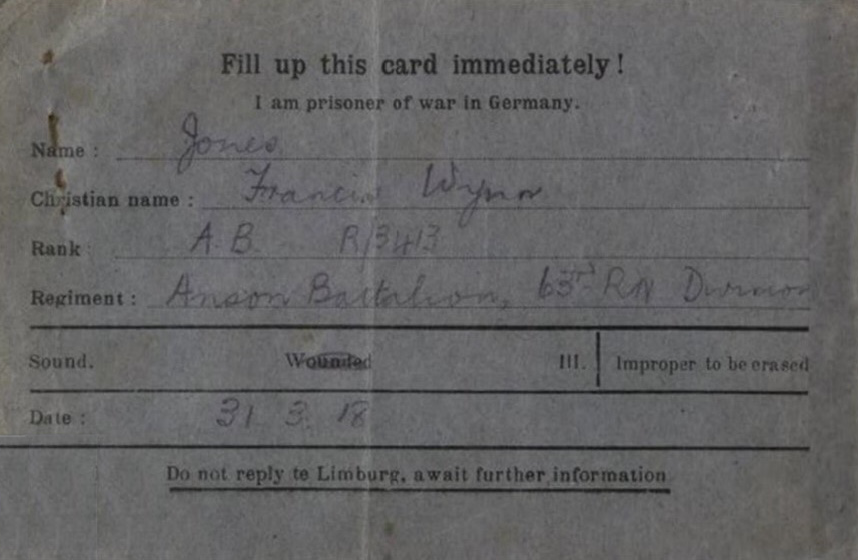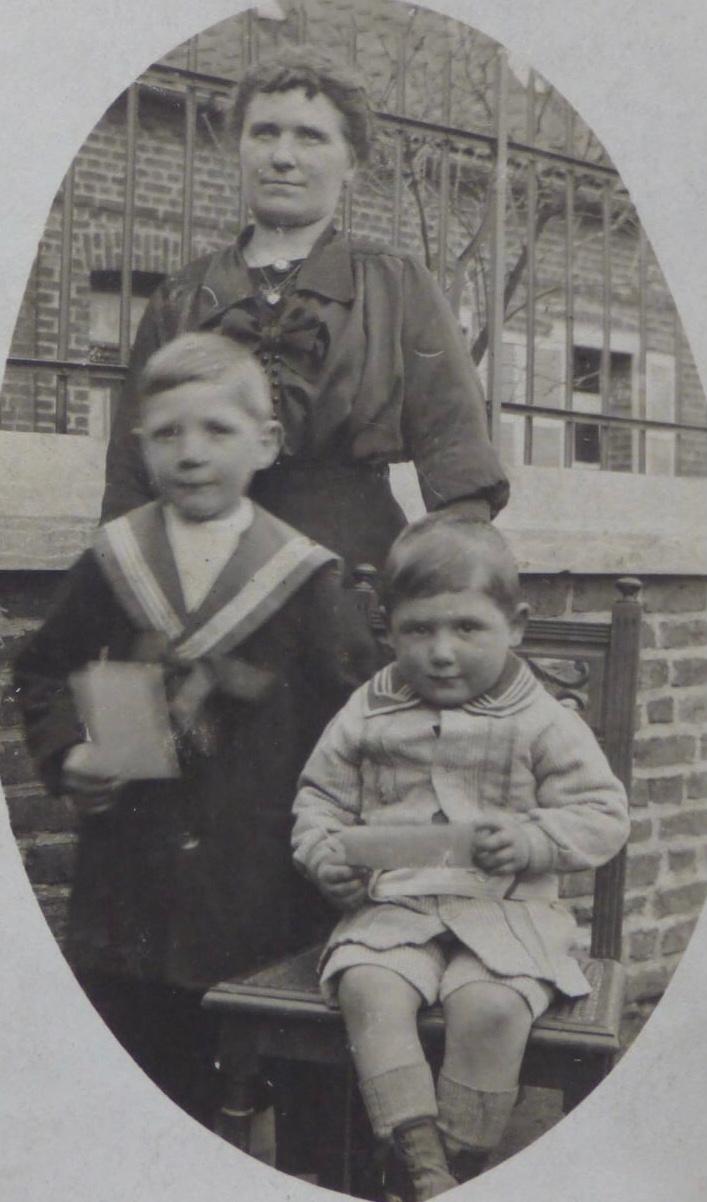Francis W. Jones R/3413
| |
|
Grateful thanks to Bob Jones for the information relating to his Grandfather.
|
Before The Great War
My paternal grandfather ("Taid"), Francis Wynn - known as "Wynn" - Jones (FWJ), was born on a farm near Llandrillo in North Wales on January 15th, 1898, the second of the four sons of Thomas Francis Jones and his wife Catherine, nee Edwards (the others being Thomas John or "Mos", Edward Owen or "Ned", and David Evan or "Dei"). He was educated at Bala Grammar School, and entered employment as a Post Office clerk in London on leaving, aged sixteen, in 1914.
The Great War
FWJ enlisted in the 2/1st Pembroke Yeomanry, part of the Territorial Force, on January 18th, 1916, just after his eighteenth birthday on 15th, and just before conscription was introduced on 21st. At this time, the Pembroke Yeomanry was based in Suffolk, and formed part of the 1st Mounted Division, which later became the 1st Cyclist Division (part of the "Pneumatic Cavalry"). The Regiment was in Southwold during the German naval bombardment of nearby Lowestoft and Great Yarmouth on April 24th, 1916. On July 11th, 1917, FWJ was taken on by the 4th Reserve Battalion of the Royal Naval Volunteer Reserve, becoming an Able-Bodied Seaman. Then, on August 6th, 1917, he was drafted into the 5th (Nelson) Battalion of 189th Brigade of 63rd (Royal Naval) Division, based in Blandford in Dorset (the former Royal Naval Division had been incorporated into the 63rd Division of the Land Army in 1916).
|

|
FWJ was deployed to France on August 28th, 1917, and eventually joined the Nelson Battalion on October 11th, 1917, just in time to take part in the Second Battle of Passchendaele, the last of the Battles of Ypres, 1917, which began on October 26th. He was taken ill on November 8th, 1917, two days before the end of the battle, and for the next three months was either in hospital in Rouen or le Havre, receiving treatment for "ICT [Inflammation of the Connective Tissue] Hand", and for an undiagnosed condition, or in Convalescence Depots, only being discharged to a Base Depot in Calais on February 19th, 1918. Finally, the Nelson Battalion having been disbanded on February 23rd, 1918, he joined the Anson Battalion of the 188th Brigade of the 63rd Division on February 28th. And he was sent to the Flesquieres-Havrincourt Salient, on the front-line, the following day, St David's Day, March 1st. He wrote a letter to his parents on his way to the front on March 1st, which read in part as follows:
Dear Father + Mother,
Just a few lines to let you know I have joined the Battalion at last and that my present address is Inf. R/3413, 3 Platoon, A Co., Anson Batt., B.E.F. [British Expeditionary Force]. We are at present in a village about 10 miles from the front, but we are going up farther tonight. ... . I am feeling alright now ... . I have not got much time to write today. I shall write again when we come back here which I hope will be Sunday.
From Wynn.
|
It would be the last that his parents would hear of him for many anxious weeks.
FWJ was reported as "missing" on the Flesquieres-Havrincourt Salient on March 23rd, 1918, during the Battle of St Quentin, the first of the First Battles of the Somme, 1918. Judging from the Anson Battalion's "Battalion War Diary", this must have been somewhere between Havrincourt and Bertincourt, very close to where his future brother-in-law, my maternal grandfather, Private Charles Reuben Clements of the 24th Battalion, the Royal Fusiliers, was in action at the same time. An unofficial letter to the effect that FWJ was "missing" was sent to his parents, from the Anson Battalion Chaplain, on April 13th; and an official one, from the Officer in Charge of Records in the Record Office of the 63rd Division, on April 20th. It was not until around April 25th that they eventually received the longed-for news that their son was safe, by way of a post-boy on a bicycle. Bless him, he rode to their farm excitedly shouting out to all within earshot on his way, "Mae Wynn yn byw, mae Wynn yn byw" (Welsh for "Wynn is alive"). It was an emotional moment. |

| 
|
| Postcard informing his family Wynn was a PoW |
|
FWJ had in fact been captured. As he later put it, "I was put with a Lewis Gun Team ... and we were all surrounded before we knew there were any [Germans] about". He spent the last eight months of the war initially in temporary Prisoner-of-War/Labour camps at Le Transloy and at St Amand in France, and subsequently in Belgium, while being registered as being in a permanent camps at Limburg, Parchim and Wesel in Germany. He was somewhere south of Tongres or Tongeren in Belgium at the time of the Armistice on November 11th, 1918. A week later, on November 18th he wrote a letter there to his parents, describing the conditions of his captivity. It read in its entirety as follows:
|
My dear Father + Mother,
At last I am able to write to you once more, but under very different circumstances from the last time. The war is over at last, thank God, and we are free once more. Our sentries left us several days ago about 40 miles south of this place and told us to find our way the best we could to Holland, but the Dutch Government will not let us cross the border as we have got to stay here until our Army comes. The Germans are still here but do not interfere with us in any way + give us no food so we have to depend on the civilian population + they seem only too glad to do it. The Belgian Relief Fund supplies food for us all but many civilian families have adopted one, two or three soldiers + those that are lucky enough to have these billets are looked after like lords. One friend of mine has the best bed in a house while the German officers billeted on the same people have to sleep amongst the potatoes! I and another young fellow get our dinner with a private family + other meals from the Relief Fund + we cannot wish for better [FWJ stayed in touch with the family after the war].
Well, I suppose I had better tell you some of my history for the last eight months. When I was captured I was taken with about 100 others to a camp at a place called Le Transloy near Bapaume. Of course I could not tell you before, but we were on very short rations [and forced to exchange valuables for bread] and as for the dinners - well, you give better stuff every day to the pigs. When I come home don't expect to see me looking exactly fat. Although I am run down, I consider myself to look well compared with some of the other poor fellows. Many have died from exposure + want of food. - From Le Transloy we shifted to a town called St Amand in Northern France + there we stayed [felling timber for a local saw-mill] till we started on the march through Belgium in October. The food was a bit better there but there is no nourishment in any of the food they give us. Since the beginning of October we have been gradually marching back before the advance of our army doing a few days' work here + there + then marching back. - I need not give you any more particulars now, I can give you them when I come home.
I am in the best of health, the only trouble has been that the change from bad to good food upset my stomach a few days ago but I am alright now.
Trusting you are all alright + hoping to see you shortly. I look forward to Xmas at home as it will be the first since 1912.
Kind regards to all,
Your loving son,
Wynn
P.S. You will see no more of the "60 mile an hour" word on the envelope! I don't know if this is censored, but it won't be by Germans.
|
|

The family Wynn was billeted with |
Ten days later, on November 28th, FWJ wrote another letter in Amersfoort in Holland, letting his parents know he was on his way home. It read in part as follows:
My Dear Father + Mother,
Just a few lines to let you know that I am slowly making my way back to the old country although I may be some time yet before I reach it. I am at present with about 3,000 others in a big camp in a place called Amersfoort waiting for arrangements to be made to send us on to England. We left Maastricht on the Belgian border last Friday ... . ... . I understand the Dutch frontier is closed to prisoners again, as all the camps in Holland are full up, so I think I was lucky to cross when I did.
We are in very comfortable quarters here, but of course we are all anxious to see the boat that will take us back home again. When I do arrive in England, I am hoping to have at least a month's leave to make up for the flesh I have lost during the last eight months. I am sure it will not take long to do that on uwd [Welsh for porage] and shot instead of Germany's pig food. Although I am a bit run down like the rest of the boys here, I am feeling alright so you need not worry about me at all.
I have been wondering whether D.J. [his younger brother Dei] has had to go abroad but of course now the war is over he will be alright.
Well, I have no more news to tell you today, but I hope to be able to tell you all about it round the fire before very long.
King regards to all
Your loving son
Wynn.
|
FWJ's enamel mug stamped "Wupperman 18", the standard issue to German soldiers and Prisoners-of-War, has now come down to me, as has the hand-made wooden box - given to him by a fellow PoW - in which he brought all his meagre belongings home from the Great War.

After The Great War
After the Great War, FWJ studied Economics at the University College of Wales, Aberystwyth, between 1919-23, and later went on to a career as a Statistician in the Ministry of Labour in London. Here he was also a prominent figure in the religious and cultural life of the thriving expatriate Welsh community, and sometime Vice-President of the Honourable Society of Cymmrodorion. He married Eluned Jones, the daughter of the famous Welsh scholar and poet Thomas Gwynn Jones, in 1926, and the couple had two children, a daughter, Nia Wynn, and a son, my father, Emrys Wynn. FWJ was awarded an O.B.E. on his retirement from the Civil Service in 1959, after which he and his wife moved into her mother's comfortable apartments in Aberystwyth (her father having died in 1949). He wrote two books in later life, both of them in Welsh. One, Godre'r Bedwyn, published in 1952, was about his experiences growing up in a rural community in the remote Berwyn Mountains at the turn of the nineteenth and twentieth centuries; and the other, Canmlwydd Siloh Aberystwyth, published in 1962, was about the history of the chapel he attended in Aberystwyth, Siloh, on the occasion of its centenary.
FWJ died on December 21st, 1970

King George V letter welcoming Wynn home
|
|
|